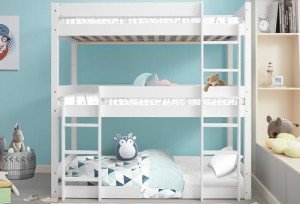Watch Out: What Bunk Beds Is Taking Over And What Can We Do About It
Exploring Bunk Beds: A Comprehensive Guide
Bunk beds have actually long been a staple in kids's bed rooms, dorms, and even homes with limited space. Not only do they provide a useful sleeping service, however they also create an enjoyable and creative environment for kids and a great space-saver for adults and households. This post will explore everything you require to understand about bunk beds, from types and products to safety tips and purchasing guidance.
Table of Contents
- Kinds Of Bunk Beds
- Conventional Bunk Beds
- Loft Beds
- Triple Bunk Beds
- L-Shaped Bunk Beds
- Material Options
- Wood
- Metal
- Safety Considerations
- Purchasing Guide
- Frequently asked questions
Kinds Of Bunk Beds
Bunk beds are available in various styles to suit various requirements and preferences. Here's a breakdown of the most typical types:
Conventional Bunk Beds
Traditional bunks generally feature 2 beds stacked vertically on top of one another. These beds are perfect for siblings sharing a room or for maximizing sleeping space in visitor rooms.
Loft Beds
Loft beds stand likewise to conventional bunk beds but do not have a lower sleeping location. Instead, they often include a desk or seating area underneath, making them a great choice for small rooms needing multifunctionality.
Triple Bunk Beds
Triple bunk beds are created for 3 residents, with beds stacked in a three-tier configuration. These are less typical but can be a fun option for big families or slumber parties.
L-Shaped Bunk Beds
With one bed placed horizontally and the other vertically, L-shaped bunk beds are frequently equipped with additional functions such as desks or storage drawers and can match corner areas in a room.
Comparison of Bunk Bed Types
Bed Type
Suitable Use
Description
Traditional
Shared bedrooms or guest rooms
2 beds stacked vertically
Loft
Small rooms requiring multi-purpose space
Upper bed with open space beneath
Triple
Large families or pajama parties
Three beds stacked vertically
L-Shaped
Corner or flexible spaces
A combination of vertical and horizontal beds
Material Options
Bunk beds are manufactured from numerous products, with wood and metal being the most common. Each material has its pros and cons.
Wood
- Durability: Generally robust and can endure years of use.
- Visual Appeal: Offers a classic look that can blend with various designs.
- Weight Capacity: Typically tougher; can support much heavier weights.
- Downsides: May be more pricey than metal alternatives and can be susceptible to scratches.
Metal
- Toughness: Generally lightweight and simple to move but still sturdy.
- Modern Design: Often comes in streamlined designs, making it appealing for contemporary areas.
- Cost-efficient: Usually less costly than wood choices.
- Drawbacks: Can be cold to the touch in winters and may not have the very same visual appeal for some purchasers.
Security Considerations
When it concerns bunk beds, security can not be neglected. Here are key safety ideas to keep in mind:
- Guardrails: Ensure that the leading bunk has guardrails on both sides to avoid falls.
- Strong Construction: Check for a solid construct and strong materials to stand up to weight and motion.
- Weight Limit: Adhere to the producer's weight limitation for both the upper and lower bunks.
- Ladder Design: Choose bunks with a safe, easy-to-climb ladder and prevent any sharp edges or rungs.
- Age Restrictions: Most producers advise that children under the age of six ought to not oversleep the upper bunk.
Purchasing Guide
When looking for bunk beds, think about the following aspects to find the very best suitable for your requirements:
- Space Availability: Measure the room size and ceiling height, guaranteeing there is sufficient space for the top bunk.
- Bed Size: Decide between twin, complete, or larger sizes based upon your requirements and the size of the room.
- Style Preference: Consider the general decoration of the bed room to discover a suitable design.
- Reduce of Setup: Look for a bunk bed that is straightforward to put together.
- Budget: Bunk beds are available in various price varieties, so figure out a spending plan before beginning your search.
Frequently asked questions
1. What is the recommended age for kids to sleep on the leading bunk?
Children aged 6 and older are normally advised to sleep on the leading bunk to minimize the threat of falls.
2. How can I make my bunk bed much safer?
To boost safety, ensure guardrails are appropriately installed and inspect that the bed is put on a flat surface area. Additionally, motivate children to use the ladder thoroughly.
3. Can I transform a bunk bed into 2 different beds?
Numerous bunk beds are created to be convertible. Check the maker's specs for convertibility functions.
4. What devices are offered for bunk beds?
Common accessories include beddings, storage drawers, staircases instead of ladders, and tented canopies for an enjoyable visual appeal.
5. How do I keep my bunk bed?
Regular look for loose screws or structural stability can help make sure security. Dust jolandathalls.top and tidy spills promptly to keep the products in good condition.
Bunk beds are versatile and a space-efficient solution for various living scenarios, from children's rooms to guest accommodations. With many designs and materials available, potential purchasers have a wealth of options to consider, ensuring a mix of usefulness and aesthetic appeals. By focusing on safety and following the suggestions described in this guide, people can find the ideal bunk bed that fits their space and lifestyle, all while creating a pleasurable sleeping environment.
